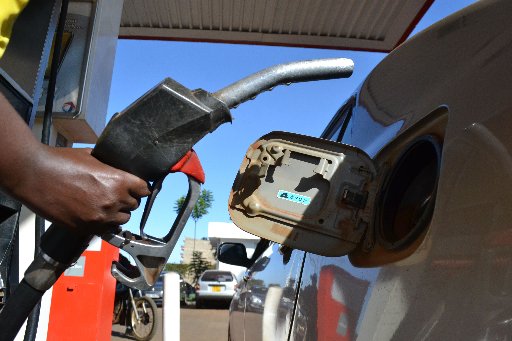The actual price of Premium Motor Spirit, PMS, also known as petrol, climbed to N205 per litre, according to documents obtained from the Petroleum Products Pricing Regulatory Agency, PPPRA,
Vanguard has exclusively reported.
What this means is that if the Federal Government deregulates the downstream petroleum industry today, petrol would be sold to motorists by petroleum marketers at N205 per litre.
According to the documents from the PPPRA, the price of the commodity appreciated by 8.47 per cent from N189 per litre recorded in April 25, 2018, to N205 per litre as at May 16, 2018.
Petrol
The price had risen from N200 per litre between May 1 and May 10, 2018, to N205 per litre between May 11 and May 16, 2018.
However, the price of petrol is still fixed at a maximum of N145 per litre, meaning that Nigerian National Petroleum Corporation, NNPC, is currently paying N60 as under recovery for a litre of the commodity.
National Bureau of Statistics, NBS, had in its Petroleum Products Imports and Consumption (Truck Out) Statistics for the first quarter of 2018, stated that 4.89 billion litres of PMS was distributed nationwide in the first three months of the year.
This translated to an average consumption of 54.33 million litres of PMS daily.
To this end, using an average of 50 million litres of PMS consumption daily, the NNPC is therefore, incurring an under recovery of N3.26 billion daily and N97.8 billion on a monthly basis.
Confronted with the rising price of PMS and rising under-recovery payments, Group General Manager, Group Public Affairs Division of the NNPC, Mr. Ndu Ughamadu, told Vanguard that “an issue is obvious: the higher the price of crude oil, the higher the price of products on the international market and the higher the landing cost. By extension, therefore, the higher our under recovery.”
Under-recovery, in downstream petroleum marketing parlance, is when the expected open market price of PMS is below the approved official retail price at the pump.
The expected open price is a combination of the cost of importation and distribution of the commodity, such as marketers’ margins, landing cost and freight cost. Under recovery is another name for subsidy, because it occurs in a situation where the selling price is lower than the actual cost of a product.
The difference with this current system of subsidy payment is the fact that the NNPC is making the payments to itself and not to other oil marketers as was the case in past subsidy regimes, since it had been the major importer and supplier of Premium Motor Spirit, PMS, also known as petrol, over the last couple of months.
Furthermore, giving the rationale for the sharp rise in the price of PMS, the PPPRA reports disclosed that during the week under reference, between May 11 and May 16, 2018, oil prices continued to soar high, stating that the average price for Brent Dated was $77.92 per barrel, Bonny Light, $78.08 while West Texas Intermediate, WTI, was $60.27 per barrel.
It added that the highest crude price, Brent Dated, for the week was $78.76 per barrel, which was recorded May 15, 2018.
It noted that within that same period, the Naira exchange rate at the Central Bank of Nigeria, CBN, fluctuated between N305.75 to a dollar and N305.85 to a dollar, while the parallel market rate was stable at N363 to a dollar.
In addition, the documents noted that the freight rate of the reference route UK-WAF recorded a slight decline during the week to end with an average of $20.36 per metric tonnes of the commodity


 :)
:) :(
:( hihi
hihi :-)
:-) :D
:D =D
=D :-d
:-d ;(
;( ;-(
;-( @-)
@-) :P
:P :o
:o :>)
:>) (o)
(o) :p
:p :-?
:-? (p)
(p) :-s
:-s (m)
(m) 8-)
8-) :-t
:-t :-b
:-b b-(
b-( :-#
:-# =p~
=p~ $-)
$-) (y)
(y) (f)
(f) x-)
x-) (k)
(k) (h)
(h) cheer
cheer



